Hello friends, today’s post combines two stories. Later today, I’m hosting an online meetup for paid subscribers. If you’d like bonus posts and an invitation to a monthly chat about running and wellness, please upgrade your subscription to the supporter level.
Reluctant campers
Friday night, I lay in our 20-year-old REI tent—a tent so bulky, it has its own duffle to carry like luggage—and what did I hear? The sound of vehicles driving on Highway 550 between Silverton and Durango.
My husband and I went camping last weekend, but to say we spent an adventurous night in nature is a stretch. We pitched that good ol’ tent at Molas Lake, a developed campground near the highway with amenities like vault toilets, fire pits, and even a camp store.
We are car campers, not backpackers. We like to kick off summer with an overnight somewhere scenic, but we prefer to set up camp next to our truck, with coolers filled with all the food and drink we want, rather than hike with minimal food and gear into the woods. That way, we can take day hikes carrying only hydration packs and leave everything else in the truck.
I spent much of the prior day getting ready—planning and shopping for an indulgent comfort-food dinner and doing the food prep ahead of time, so all the ingredients would be easy to toss together; plus, getting our sleeping bags, pads, and inflatable camp pillows out of storage; then loading up camp chairs, a folding table, and cookware.
It was a lot of work, and I knew we’d have to spend a good chunk of the weekend cleaning and putting everything away after we returned home. I pondered, “Why are we doing this?” We could’ve reserved a hotel room in Silverton instead.
We do it because it’s a tradition, connecting me to my family’s campouts and both of us to our earlier, cheaper days when we’d camp as much to save money as to get outdoors. But mostly, it’s fun and feels borderline silly. It forces us to focus on each other, and it gets us out of our normal, comfortable way of living. It makes us simply sit outdoors in the fresh air and relax, taking in the view of a lake and the sounds of birds.
“Once a year, like taxes,” Morgan dryly remarked as we spread out the tent, making me laugh.
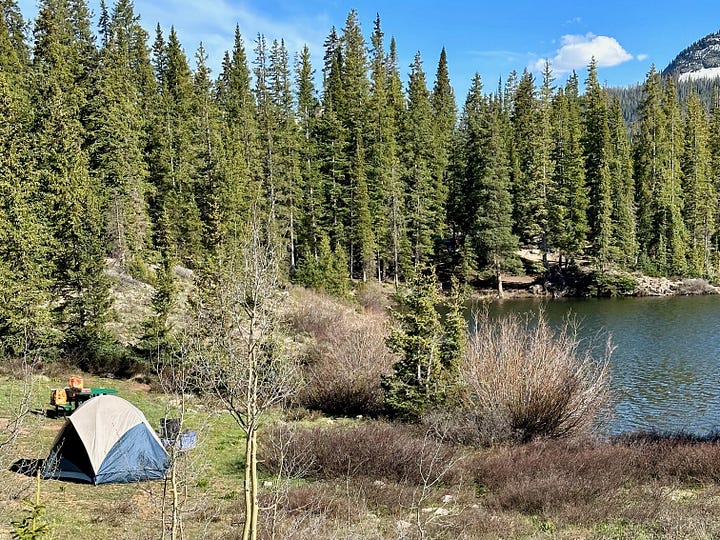
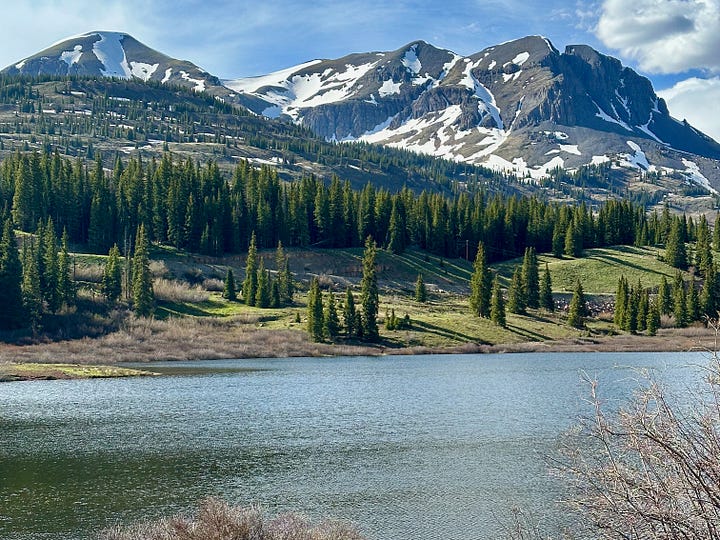
Our trusty two-burner camp stove that I bought a decade ago let us down, however. Something broke between the gas canister’s valve and the insertion point in the stove, so we couldn’t get gas to flow without hissing and leaking. Thus ensued the challenge of lighting a real fire and cooking over flames. (Thankfully, the campground allowed fires in established pits, and the early-season greenery meant that fire risk was lower than usual.)
The drawn-out process of browning beef, sautéing veggies, and putting it all together with some pasta, broth, and grated cheese in a Dutch oven for chili mac (recipe) became progressively entertaining, giving us the giggles. We had a crappy camp-supply can opener that took mini bites out of the lid rather than carving a smooth opening. We forgot potholders, so I sheepishly had to ask a couple in an RV to borrow theirs. Then we had leftovers that looked like prime bear bait. Should we save it, dump it, eat it? (Answer: dump it in the camp’s locked dumpster, sadly.)
Cooking at home rarely is as interesting as over a campfire, and the result was tastier than most weeknight meals.
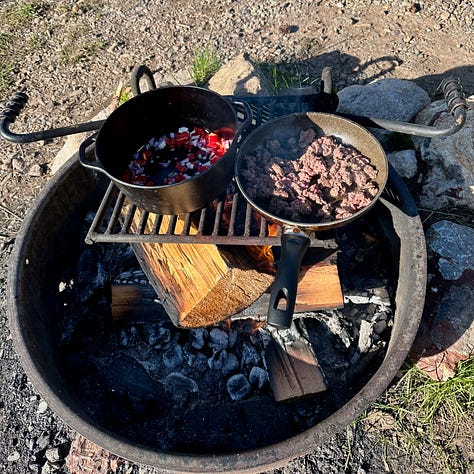
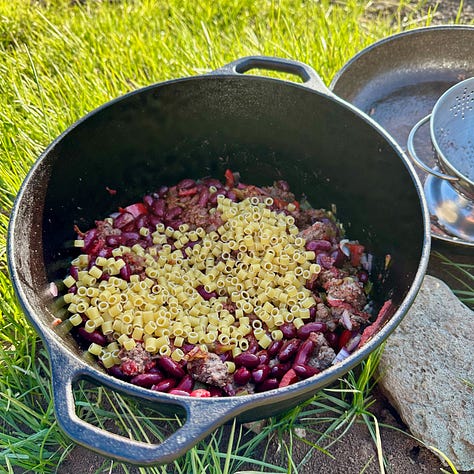
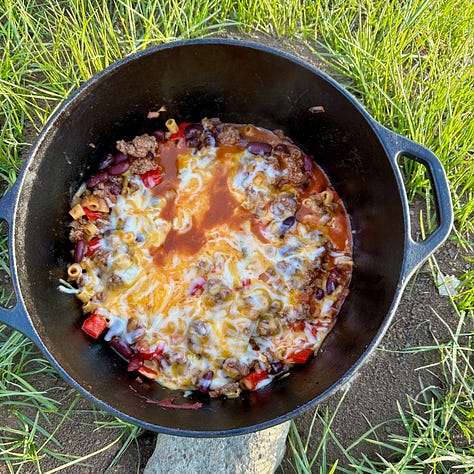
That said, I like but don’t love camping, because I prefer sleeping in a bed and taking a shower. It’s embarrassing to admit this as an alleged mountain adventurer, but camping once a year feels like enough. (I’ll probably like it better when I upgrade my old sleeping bag to feel cozier at night.)

The best parts of our camping trip involved hiking before and after the campsite time, and visiting my favorite cafe in Silverton on Saturday morning rather than trying to cook breakfast at camp. I loved being back in Ouray and Silverton, climbing a couple of trails that I got to know five years ago while training for the Ouray 100. If you look at the course route for that ultra, I’d recommend any segment as a day trip, except for the portions on jeep roads.
Note: Ouray is pronounced “you-RAY” not “OO-ray,” and if you want to learn a bit about Chief Ouray, read this earlier post about the region’s history:
We hiked up to Chief Ouray Mine on Friday, and then we tackled Hayden Pass on Saturday morning. We went slowly and took plenty of rest stops, which meant I relaxed into the mellow mind frame described in my earlier post about the Camino de Santiago. There’s something refreshing and gratifying about hiking just for hiking’s sake and for being together, not to log miles for training or to meet an elevation or distance goal.
We turned around at around 11,400 feet of elevation because the snow traverses became too slippery and troublesome to enjoy.
I’m glad we made the effort to get out for that special Friday night lakeside date. But I’m also content to wait a year to do it again.
For more specific advice on car camping and campfire safety, read my post from last June’s trip:
Fixating on health and what-if’s
On Monday, we had a different, less exciting date. We found ourselves in the 4H Center in Ridgway, part of the Ouray County fairgrounds, which is a place we normally go to watch rodeo or skijoring. This event, however, was a health screening, so we waited with about a dozen others—mostly seniors, but some younger adults—to take turns lying on examining tables while getting poked and scanned.
It was my idea, and I’m grateful Morgan went along. For $159, this service by Life Line Screening uses ultrasounds and other devices to assess risk for stroke, aneurysm, and heart disease. (I paid an extra 20 bucks for a bone density check too.)
For me, aging has brought a fixation with health, bordering on anxiety, even though all markers show I’m healthy and fit. I took a couple of online quizzes for biological age, which assessed my biological age at 36 to 41, but I’m actually 54. My resting pulse is close to 40 even in high altitude, and my blood pressure is so low that nurses always second-guess the reading.
But I worry—I suspect excessively—about health. One of my deepest fears is that my husband, who’s been my best friend since adolescence, will die before me from illness or an accident (a fear stoked by his hospitalization in 2020 from covid). The close runner-up is my fear of developing dementia and/or a disease like cancer. I’m borderline obsessed with my kids’ health, even though they’re healthy young adults, because I don’t want them to engage in any of the risky behavior I did when I was younger.
Consequently, through adulthood, I’ve become increasingly concerned with nutritious eating (that less-healthy campsite meal described above being an anomaly) and preventative health screenings. I prepare leafy greens for Morgan and me daily, and I’ve banned the salami he loves from our fridge. I encourage him to the point of nagging to drink less alcohol, take Vitamin D, and hike or bike.
I understand the root of my concern, despite my objective good health and uber-healthy lifestyle. It has to do with seeing my parents live their final decade in painful poor health from lifelong smoking and, in my mom’s case, dementia. I’m also haunted because the grandmother I never got to meet—who climbed mountains and helped manage a ranch before settling into a career as a librarian—died suddenly at 49 from an aneurysm.
My brother-in-law (Morgan’s only sibling) died at 52 from colon cancer. An ultrarunning friend in his early 50s died suddenly earlier this year from an undetermined heart condition (an enlarged heart with no underlying disease, but we runners all have larger hearts, right?). The list goes on and spooks me.
On a deeper level, I’m disturbed by picturing the unhealthy person I could have been. An alternate version of me would have kept partying and never discovered running.
I thought about this while lying with my eyes closed on a table as one worker scanned my carotid artery and another tested for a-fib. These health care workers had a classic rock playlist playing louder than seemed appropriate for the setting, but I liked it.
The Who’s “Baba O’Riley” (a.k.a. “Teenage Wasteland”) came on, and I instantly felt transported to a Who concert in early 1989 (or late ‘88?), about to turn 20, where I was as wasted as the lyrics proclaim. Back then, I smoked Camel Lights, ate fast food, and weighed more than 20 pounds more than I do now. At the concert, I had taken an inebriating mix of speed and LSD, which created a heady, transcendent (and of course, imaginary) connection with the song and the band.
I surmise that I developed that way through adolescence and young adulthood because I’m the youngest of five, and my four much older siblings and their peers—and even some of my parents’ peers, too—exposed me to the drugs and drinking that were common in the late 1970s and ’80s. I had permissive parents who generally praised and laughed whenever we did something subversive.

As the tag-along baby of the family, I developed into an attention-seeking risk-taker. A counselor at my high school sternly warned me that I was on “a path of self-destruction.” Thankfully, an academic bent and the responsibility to care for a horse became my saving graces and the things that kept me from going over the edge.
Two of those sibs put me on a different, healthier track when they bought me a mountain bike for my 20th birthday, when I was at UC Santa Cruz, so I could bike to campus instead of ride the bus. I was in such bad shape that I couldn’t pedal up the hill, but that weakness ignited a spark of challenge that prompted me to quit the pack-a-day Camel habit. Once I quit smoking (one of the hardest things ever), I cut back drinking and partying, because I knew that getting buzzed would make me want to smoke again. So that bike—which I finally was able to ride all the way up the hill from the beach to UCSC—became a first step toward healthy living. Five years later, as a grad student, I discovered running.
All that history and the what-if of an unhealthy parallel universe instantly ran through my mind when I heard that song and flashed back on the Who concert. Now here I am in my mid-50s, and Roger Daltry and Pete Townshend are close to 80. I’d like to know what their biological ages after a lifetime of hard living are.
I hope my running and healthier nutrition have erased the damage to my body from the first 20 years of life (I cringe when I think of all the second-hand smoke I inhaled in our smokey home, before I took up the habit at 16), and that my cardiovascular fitness will keep my mind sharp, bones strong, and heart healthy. But who knows?
I won’t get the results from this health screening for a couple of weeks, and I’m a little nervous about what they’ll reveal, because twice in recent years I’ve been surprised by findings from doctor visits.
The first time, four years ago, Morgan and I went to a dermatologist to get our skin checked. I pushed him to do it because his mom has melanoma. He, however, has virtually perfect skin. But the dermatologist found a lot of pre-cancerous spots on my arms that needed removal.
Then we got colonoscopies. I didn’t think I needed one. But as soon as I came out of the haze of anesthesia, the doc told me it’s a good thing I got it done, because I had an aggressive pre-cancerous polyp with a genetic component. He told me to get a colonoscopy every three years instead of five, and to tell my kids to get their first colonoscopies by 40 at the latest. Whoa, I wasn’t expecting that.
I decided to share all that unflattering personal history simply to encourage you readers to get checked and stay on top of your health. Beyond that, I wanted to show the obvious fact that life can follow many different pathways, and it’s never too late to transition to a healthier one (or, conversely, to slip onto a more damaging one).
Despite getting screened and taking care of myself, however, I know I’m not in control. I can’t prevent a reckless driver from drifting into my lane and hitting me head on, for example. Perhaps that’s why I’m a bit of a control freak when it comes to controlling what I can.
My first coach, who I trained with 25 years ago, used to say, “Your health is your wealth,” and, “Every day you can run is a good day.” Those sayings ring true now more than ever.
How about you, did an unhealthy past make you healthier now? Feel free to comment below.






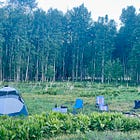
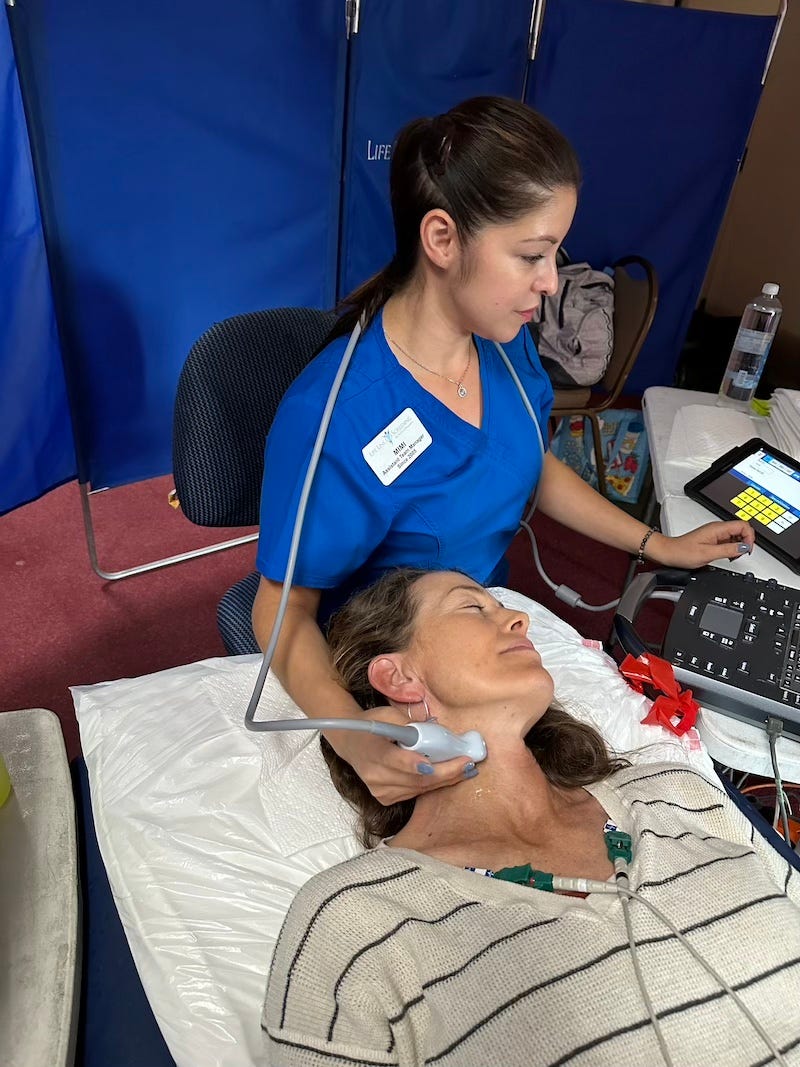
Great read as always! I completely understand the health situation as I’ve been diagnosed with osteomyelitis (4 surgeries total, one to rebuild my upper spine with 12 screws) and am now being treated for ocular melanoma. I too was an athlete. Competitive gymnastics and dance was my life! I was able to hike constantly & water/ snow ski. Now I’m happy to just move more freely & walk dogs. Physical adjustments are challenging. Mentally I’m PUMPED and truly happy with my life at 67 yrs young!!
once again, such a good read. and so relatable. I can relate to the smoking, drinking, drug behavior of youth, but add to that an eating disorder and I ended up with a diagnosis of osteoporosis, despite my most recent 20 years of healthy eating and exercise. I'm doing all I can now to keep and improve my health, yet not getting obsessive about it (ie eating disorder history).